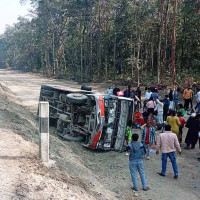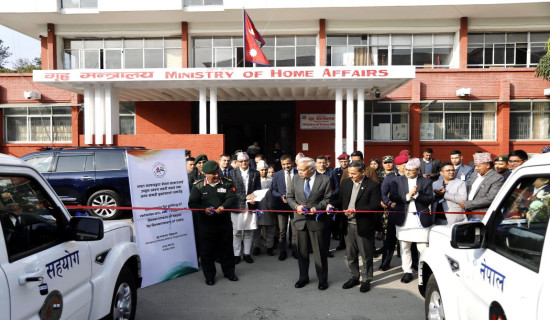- Thursday, 12 February 2026
‘Primary focus to generate 28,000 MW electricity in next 12 years’
By A Staff Reporter,Kathmandu, Feb. 24; Minister for Energy, Water Resources and Irrigation, Shakti Bahadur Basnet, has said that the reliance on fossil fuel-based energy production, coupled with the escalating fuel and energy prices, has been placing an enormous burden on the climate and environment of the South Asia region.
“This unfolding scenario paints a bleak picture of our world, with the looming threat of increasingly frequent climate-induced disasters,” he said while speaking at a workshop on ‘Energy Transition for Economic Prosperity’ jointly organised by the Alternative Energy Promotion Centre (AEPC) and Renewable World (RW) in Lalitpur on Friday.
According to him, these challenges could only be averted through robust action plans. Nepal recognises the urgent need for a clean energy transition in our energy sectors, as reflected in its policy roadmaps, added Minister Basnet.
“To strike a harmonious balance in energy production and consumption, we have updated our energy sector roadmap and action plans as per the existing realities and bilateral and multilateral agreements,” he said.
Nepal’s primary focus is to generate around 28,000 MW of power in the next 12 years, with a significant emphasis on hydropower and other renewable sources.
In line with this, the country has developed plans to upgrade our transmission and distribution infrastructure to facilitate power flow from generators to consumers effectively, he added.
This endeavor is essential to meet the growing domestic and regional demands, stated Minister Basnet and added, “Our unwavering commitment extends to the development of sustainable and climate-resilient energy infrastructures.”
According to him, to boost energy transition for economic prosperity, the Government of Nepal encourages investment in electricity generation, transmission, distribution and trade. Additionally, it promotes research and development, facilitates public-private partnerships and has streamlined regulatory frameworks.
Minister Basnet informed that the government has been focusing on five interlinked strategic directions for renewable energy development in the country that include transformational energy access, up-scaling of technologies, grid interconnection of renewable energy systems, increasing share of renewable energy in the national energy mix, and sustainability of energy systems.
“We have been working on reforms in energy policies to attract more private sector investment and create conducive environment for sustainable energy development,” he added.
Secretary of the Ministry of Energy, Water Resources and Irrigation (MoEWRI) Sushil Chandra Tiwari said that renewable energy is important to complement and replace other energy sources.
Likewise, Nawa Raj Dhakal, Executive Director of the AEPC, stressed transmission efficiency and said that access and reliability of energy was crucial for development and economic prosperity.
Al Rechardson, Global Programme Director of RW, said that renewable energy has greatly supported in agriculture, job creation, and food security.
“Other key areas like health and education also depend on the availability of renewable energy, and allows more time to people to perform other creative and family works,” she said.
According to Richardson, renewable energy has also supported in the operation of the early warning system for disasters and floods in the remote areas.
Thakur Thapa, Country Director of RW, said that renewable energy has helped in facilitating and transforming work and lives of people across the country.
He said that Nepal’s second Nationally Determined Contribution 2020 targets to expand clean energy alternatives. Meanwhile, energy transition is crucial to achieve the target of net-zero world by 2050, Thapa said.
Guna Raj Dhakal, Chairperson of the Renewable Energy Confederation of Nepal, said that it was unfortunate that the government slashed the budget to renewable energy to one-third while the need demanded it to be doubled, at least.
The renewable energy not only helps in mitigating various crises including that induced by climate change but also supports in creating jobs and economic opportunities, he said.
Dhakal stressed the need to build large-scale biogas production plants in the urban centres, and optimum use of solar and hydropower potential to assure quality energy to people.
Net metering should be promoted and there should be a good price offer to energy alternatives, he said.
Similarly, Bhagwan Shrestha, Chairperson of the Association of International NGOs in Nepal, said that policy interventions are needed to promote the development of alternative energy so that the agenda 2030 of leaving no one behind as well as clean and green development could be achieved.

















